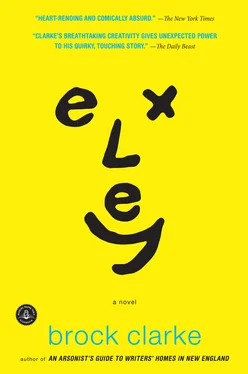Anyway, here’s what I read:
EXLEY’S FAVORITE WORDS AND SAYINGS
Jesus H. Keeriiisst.
For Christ’s sake.
The trip began on a depressing note.
I had incapacitated myself.
Cha (you).
You’re a goddamn drunken Irish poet!
C’mon, friend.
How does one get into this business?
Oh, Jesus, Frank!
Oh, Frank, baby!
Aw, c’mon, you goofies!
It is very wearying to be honest.
Nobody, but nobody.
I’ve got human life — do you understand that? Human life! — in my hands.
Literary idolaters fell somewhere between blubbering ninnies and acutely frustrated maidens.
It was my fate, my destiny, my end, to be a fan.
Life isn’t all a goddamn football game!
I wanted to risk great happiness but I never got the chance.
There are certain appeals that quite startle and benumb the heart.
Fuck you.
After I finished, Harold clapped, like he always did for me when I read something aloud in class. J. gave me a little smile, like she didn’t know exactly what I was talking about but wanted me to keep talking anyway. But no one else clapped or smiled at me or even looked in my direction. They were all looking at one another as though someone — me, or them — had totally misunderstood the assignment.
“So whatever that means,” L. finally said.
“That was completely inappropriate, Miller,” Mrs. T. said. She had gone back to her desk and was holding her grade book in one hand, her red pen in the other. We got either a minus or a check for our “freewrite.” I guess that was true for this assignment, too. I could tell by the way Mrs. T.’s pen moved that I got a minus. I don’t know about you, but bad grades make me feel like I have to go to the bathroom. They make me feel anxious, and when I get anxious, I’ll say things I shouldn’t.
“All that was from this great book called A Fan’s Notes, ” I said. “written by Frederick Exley.” By the way Mrs. T. reacted, I was pretty sure she’d never heard of the book or the guy who wrote it. She put on her glasses, then cocked her head and looked at me warily, like she knew I was about to say something objectionable. “I was thinking maybe we could read and talk about that book after we’re done talking about this one?”
Mrs. T. opened her mouth, but before any sound came out, J. said, “Maybe we should.”
Mrs. T. closed her mouth. But like every teacher, she had someone to speak for her when she didn’t feel like speaking for herself. “So why would we want to do that?” L. asked. He picked up the America on the Same Page book and read aloud from the back cover, which, like all America on the Same Page books, said, “This America on the Same Page book reminds us what it is to be an American and to live in difficult times.” “So I don’t know how his book” — and here L. pointed at me — “reminds us of that.”
J. squinted at L. and said, “Thanks, but I don’t think I need to be reminded.” Then she stood up, shouldered her backpack, and stomped out of the room, leaving behind her copy of the book. Once the door slammed behind J., the room was absolutely quiet — there’s no room as quiet as the classroom a kid has just walked out of without the teacher’s permission — until finally Mrs. T. cleared her throat, so that we looked at her instead of looking at the door. Her pen was in her hand, and she was looking at me over her glasses, like what had happened was my fault and not J.’s or L.’s or hers.
“Next time, Miller,” she said, making another minus mark in her book, “use your mine-duh.”
Doctor’s Notes (Entry 13)
After breakfast (grapefruit, brown sugar) I locate the Veterans Affairs hospital: it is exactly where M. described it and as M. described it. The automatic doors open as he said they would. The female receptionist is seated behind the desk; she is physically as M. described her. I approach her desk and wait for her to recognize my presence; she does not. The swinging doors behind her open and several men rush through them pushing another man on a gurney. The man on the gurney is moaning piteously. But I labor to ignore him. As any mental health professional will tell you, sometimes you have to ignore human suffering — or even make it worse — in order to heal human suffering. It is my understanding that the branches of our armed forces operate under a similar assumption. Which is yet another example of how the mental health profession has a great deal in common with other of our most significant professions.
Regardless, I continue to wait to be acknowledged by the receptionist. She stares at her computer screen for several long moments, then types furiously, then stops again and stares at the screen, fingers poised over the keyboard. I stand there, waiting for her to look up and say “Hello” or some such conventional greeting, but she does not. I think of how useful M. would be at this moment. Perhaps M. could teach her how to speak and when, the way he has taught me.
Finally, I clear my throat. “Ahem,” I say. She looks up at me; her fingers rise from the keyboard, and with both hands she grips the desk, tightly, as though she might flip it over. Her eyes are buglike, although I don’t think thyroidal: I believe she makes them buglike. She is distinctly unfriendly — unfriendly and, indeed, hostile . I take a step back, and that seems to mollify her somewhat: her eyes recede a little back into their sockets.
“Yes?” she inquires.
“Yes,” I say. “I’m looking for one of your patients.”
“And who are you?” she asks, as though I’d told her I was looking for myself. This takes me by surprise — by surprise and, indeed, unawares — which is why I sputter a bit before telling her my name, then repeating my name and putting my title — Doctor —in front of it. This perhaps makes things worse: when she hears I am a doctor, the receptionist bulges her eyes again. “What kind of doctor?”
“I’m a mental health professional,” I say.
“A psychiatrist?” she asks.
“Just as I said,” I say. The title psychiatrist has sundry unfortunate associations and attendant nicknames — shrink, headshrinker , and the like — and it is my learned opinion that if we call ourselves mental health professionals, then those associations and nicknames will disappear and we will no longer be thought of as lab-coat-wearing goons who wield long, dripping needles, or who strap patients onto the electroshock table, or who scalpel out the offending part of the frontal lobe. This is why I have for several years lobbied my professional association to change their name from the North Country Psychiatric Association to the North Country Mental Health Professionals. So far, they have not done so, but I’ve begun calling them, and us, by that name anyway, hopefully to facilitate the change. “I’m here to see T.L.R.”
“Is he your patient?” the receptionist asks, still looking at me and not at her computer screen, where presumably M.’s father’s name could be found or not.
“Well, not exactly,” I admit.
“Not exactly?”
“He’s the father of one of my patients,” I say. Her eyes advance further toward me and away from her face; I can tell this is starting to go badly. “A boy. Nine years old. Dirty blond hair cut into a bowl shape. Tiny teeth. He says he’s been here to see his father. He even mentioned you.”
The receptionist raises her eyebrows, then once again begins staring at her computer screen. I think perhaps she is looking up the name T.L.R. after all. But after a minute she says, still staring at the screen, “Only immediate family members are allowed to visit the patients.”
Читать дальше












